API Integration for Cold Email Campaigns
Cold email campaigns thrive on automation, compliance, and deliverability. API-driven email infrastructure simplifies mailbox setup, DNS configuration, and compliance management, ensuring emails reach inboxes while adhering to regulations like the CAN-SPAM Act. Platforms like Primeforge, Infraforge, Mailreef, Hypertide, and Mailgun offer varying solutions tailored to different business needs. Here's a quick breakdown:
- Primeforge: Automates Google Workspace and Microsoft 365 mailbox setup with US-based IPs, ensuring high deliverability.
- Infraforge: Focuses on private infrastructure with dedicated IPs and advanced customization.
- Mailreef: Offers fast domain and mailbox provisioning with a dedicated email infrastructure.
- Hypertide: Limited details available, but provides moderate API functionality.
- Mailgun: Best for transactional emails, not ideal for cold outreach.
Quick Comparison
| Platform | Key Feature | Best For | Pricing |
|---|---|---|---|
| Primeforge | US-based IPs, DNS automation | Cold email campaigns | $3.50-$4.50/mailbox |
| Infraforge | Private infrastructure, dedicated IPs | Large-scale, high-volume campaigns | Custom pricing |
| Mailreef | Fast provisioning, isolated infrastructure | Agencies, smaller campaigns | Not specified |
| Hypertide | Moderate API functionality | General email infrastructure | Not disclosed |
| Mailgun | Transactional email focus | Transactional email workflows | Pay-as-you-go |
Choose based on your campaign scale, technical needs, and budget. Primeforge is ideal for straightforward cold email setups, while Infraforge suits enterprises requiring full control.
1. Primeforge
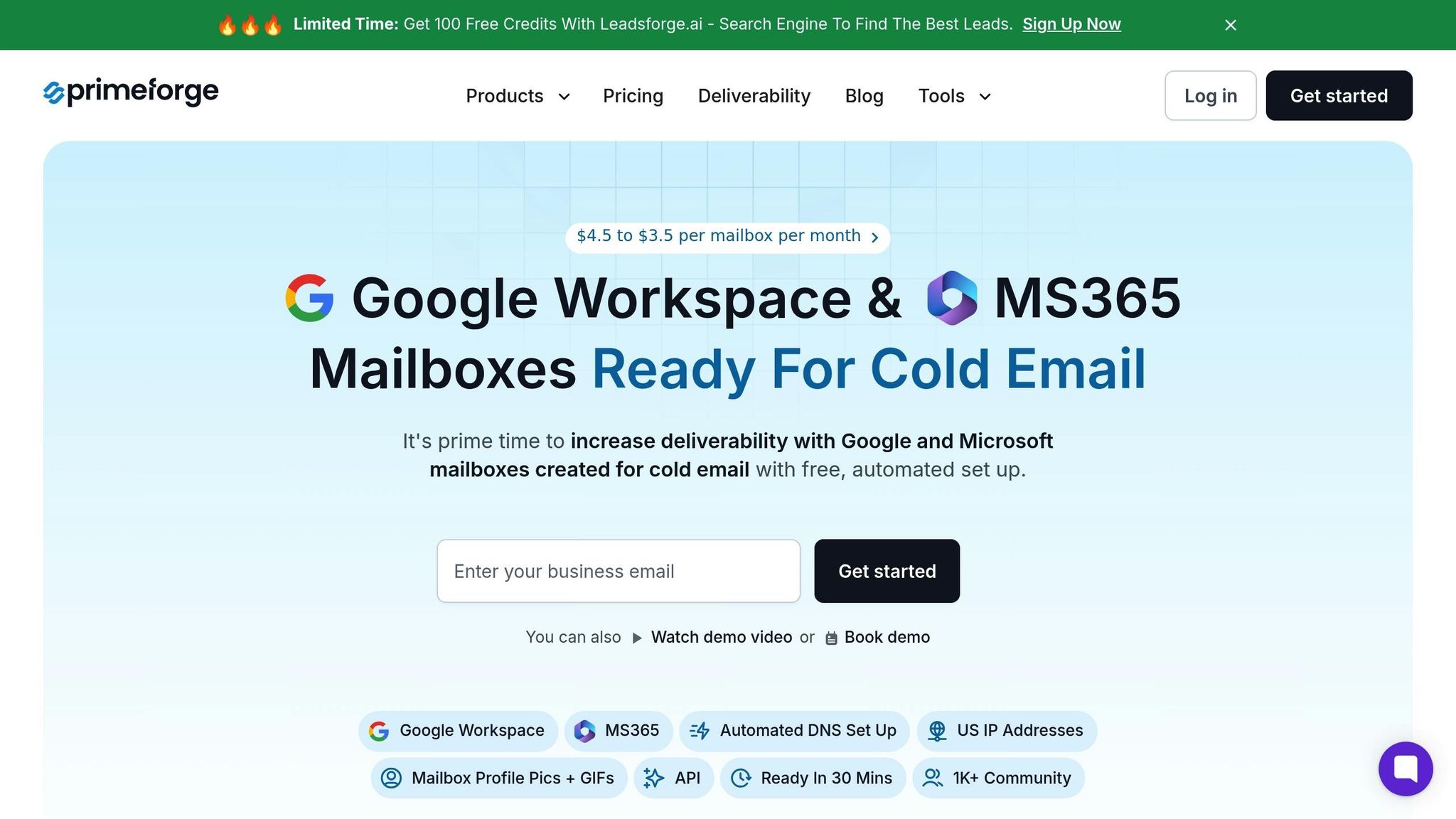
Primeforge is designed specifically for building a solid cold email infrastructure, making it a powerful tool for outreach campaigns. What sets it apart is its ability to automate the entire mailbox setup process through its API. From creating mailboxes on platforms like Google Workspace and Microsoft 365 to configuring DNS settings, Primeforge handles it all. The API also takes care of setting up DMARC, SPF, and DKIM records, and it supports bulk operations - allowing businesses to configure multiple mailboxes at once with consistent settings.
One of Primeforge's key strengths is its US-focused infrastructure. According to the company, "All mailboxes are provisioned with US IP addresses, which are trusted by major email service providers and help avoid regional deliverability issues".
"Primeforge sets you up with Google or Microsoft mailboxes on US IPs - the gold standard for cold email infrastructure." - Mailforge
This focus on US IP addresses is especially beneficial in the cold email industry, where deliverability is a constant challenge. In 2023, it was reported that up to 45.6% of cold emails ended up in spam folders. By using trusted US IPs, Primeforge increases the likelihood of emails landing in recipients’ primary inboxes rather than being flagged as spam.
The platform's performance speaks for itself. Rahul Lakhaney, former VP at Gartner and current CEO of Enrich.so, highlighted Primeforge's impact on deliverability, noting improved results after migrating 10,000 daily emails to Primeforge mailboxes. This shows its reliability for handling high-volume campaigns.
Primeforge also integrates smoothly with various cold email tools, thanks to its standardized API endpoints for mailbox management. This makes it easy for development teams to incorporate Primeforge into existing workflows. With pricing ranging from $3.50 to $4.50 per mailbox per month, it offers a scalable and cost-effective solution for businesses running large outreach campaigns.
2. Infraforge
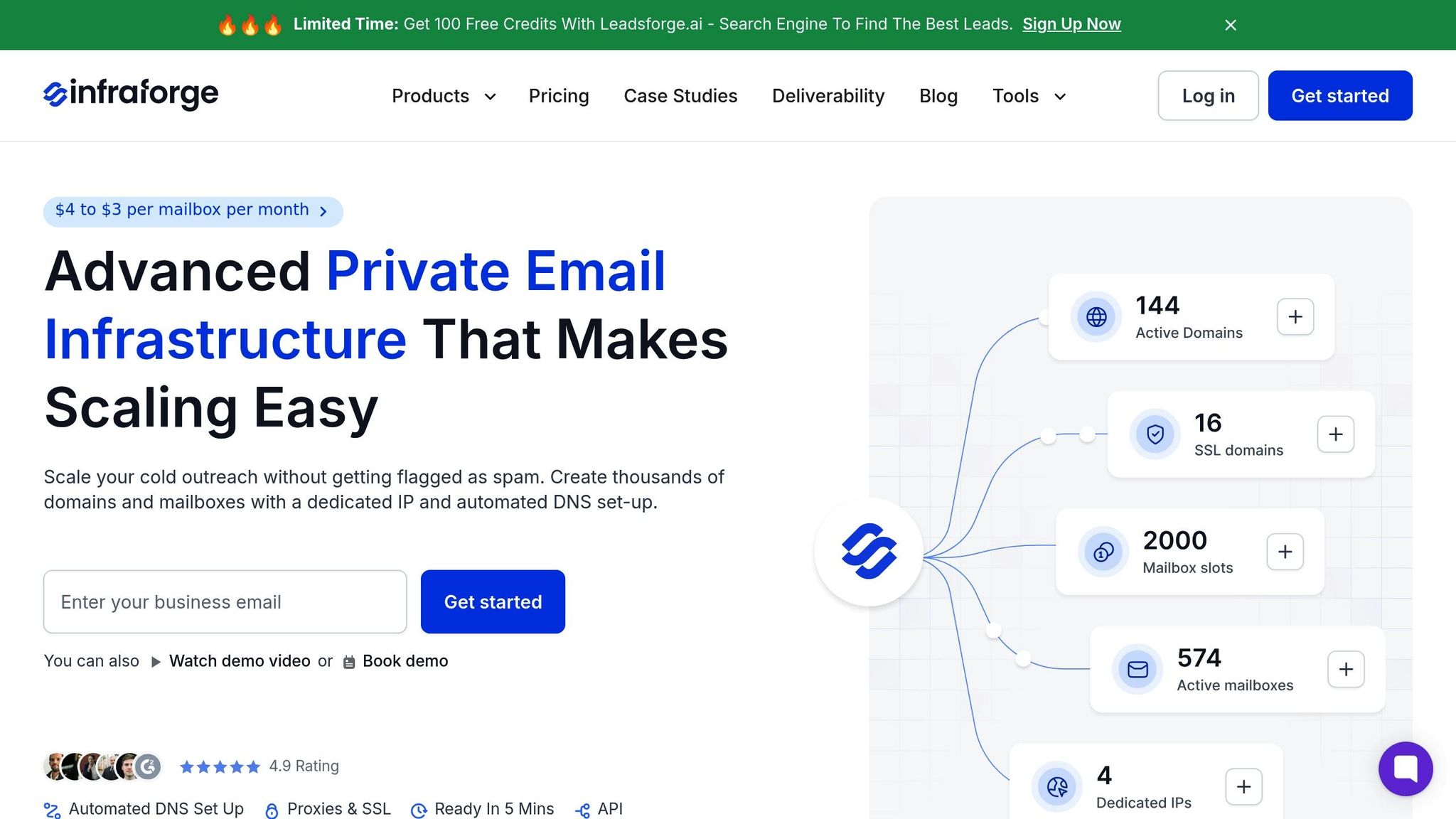
Infraforge provides businesses with a private email infrastructure, offering complete control over their email-sending environment - perfect for scaling cold email campaigns.
One of its standout features is dedicated IP allocation. By assigning dedicated IP addresses, Infraforge helps distribute email volume efficiently and reduces the risk of blacklisting during high-volume campaigns.
Its API offers enterprise-level customization, allowing businesses to manage custom domains and fine-tune email routing for better performance.
For agencies and software companies, Infraforge also supports full rebranding. This allows them to present the email infrastructure as their own, giving the appearance of an in-house email service.
On the deliverability front, Infraforge's private infrastructure ensures that each client’s sending practices remain isolated, protecting individual reputations from being impacted by others.
Additionally, the platform's API integrates smoothly with existing systems, simplifying the setup and management of email workflows.
Pricing for Infraforge is customized based on a client’s specific volume and infrastructure needs. Up next, Mailreef brings another layer of deliverability optimization to these capabilities.
3. Mailreef
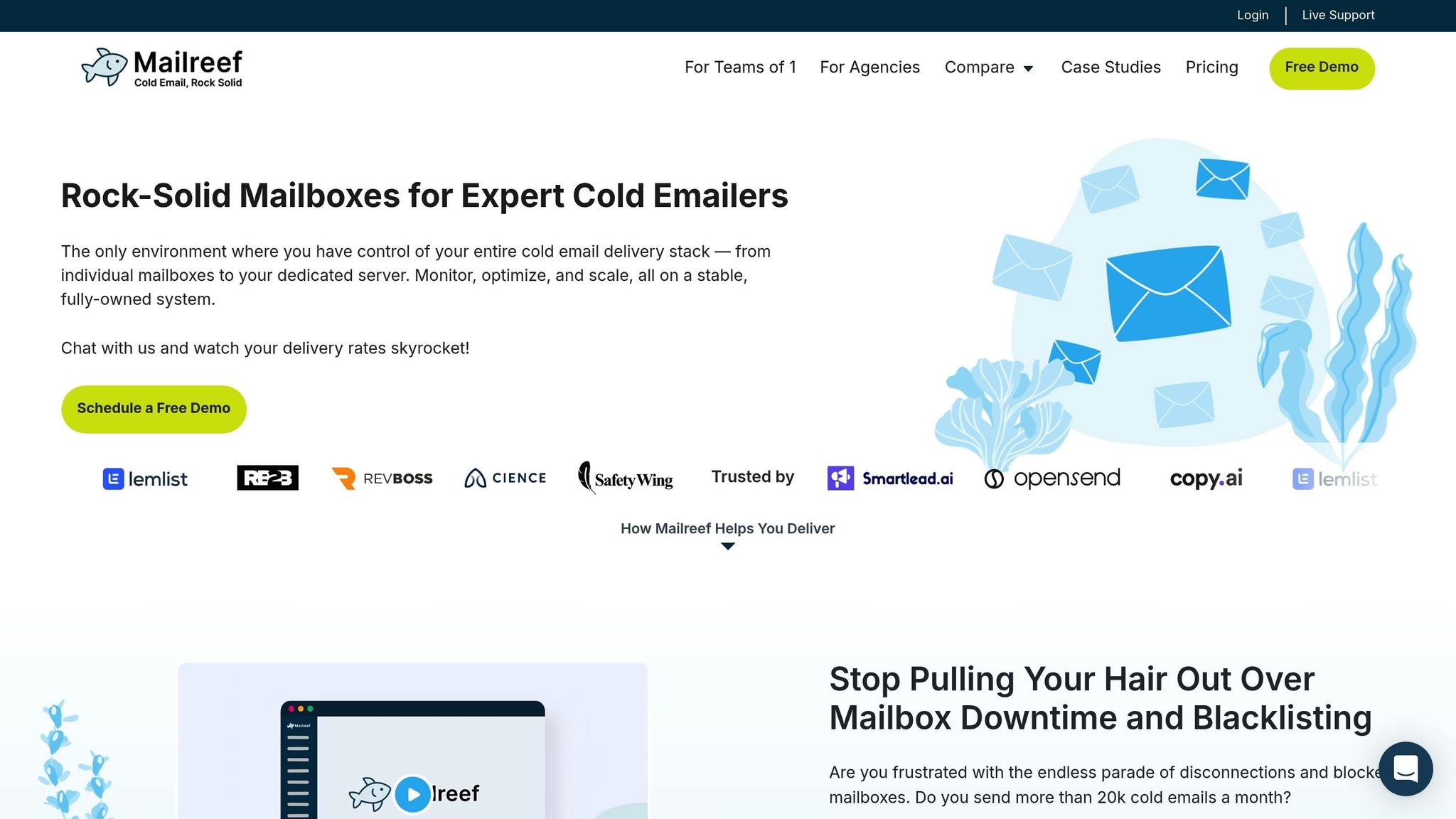
Mailreef provides users with their own dedicated server and IP address, giving them complete control over email reputation and deliverability. Through its API, Mailreef automates the setup of dedicated servers, unique IPs, and critical DNS records like SPF, DKIM, and DMARC for every mailbox. This streamlined, automated process sets it apart from platforms that rely on more conventional mailbox provisioning methods.
One standout feature is Mailreef's ability to provision a new domain and mailbox in just 30 seconds. This speed is especially advantageous for agencies looking to scale their cold email campaigns efficiently.
Unlike platforms such as Google Workspace or Microsoft 365, Mailreef runs its own dedicated email infrastructure specifically designed for cold email campaigns. Each mailbox includes full SMTP/IMAP credentials, making it easy to integrate with popular cold email tools and marketing automation systems.
While teams may need to adapt to Mailreef's unique setup, its isolated infrastructure helps maintain deliverability by protecting the reputation of every individual mailbox.
4. Hypertide
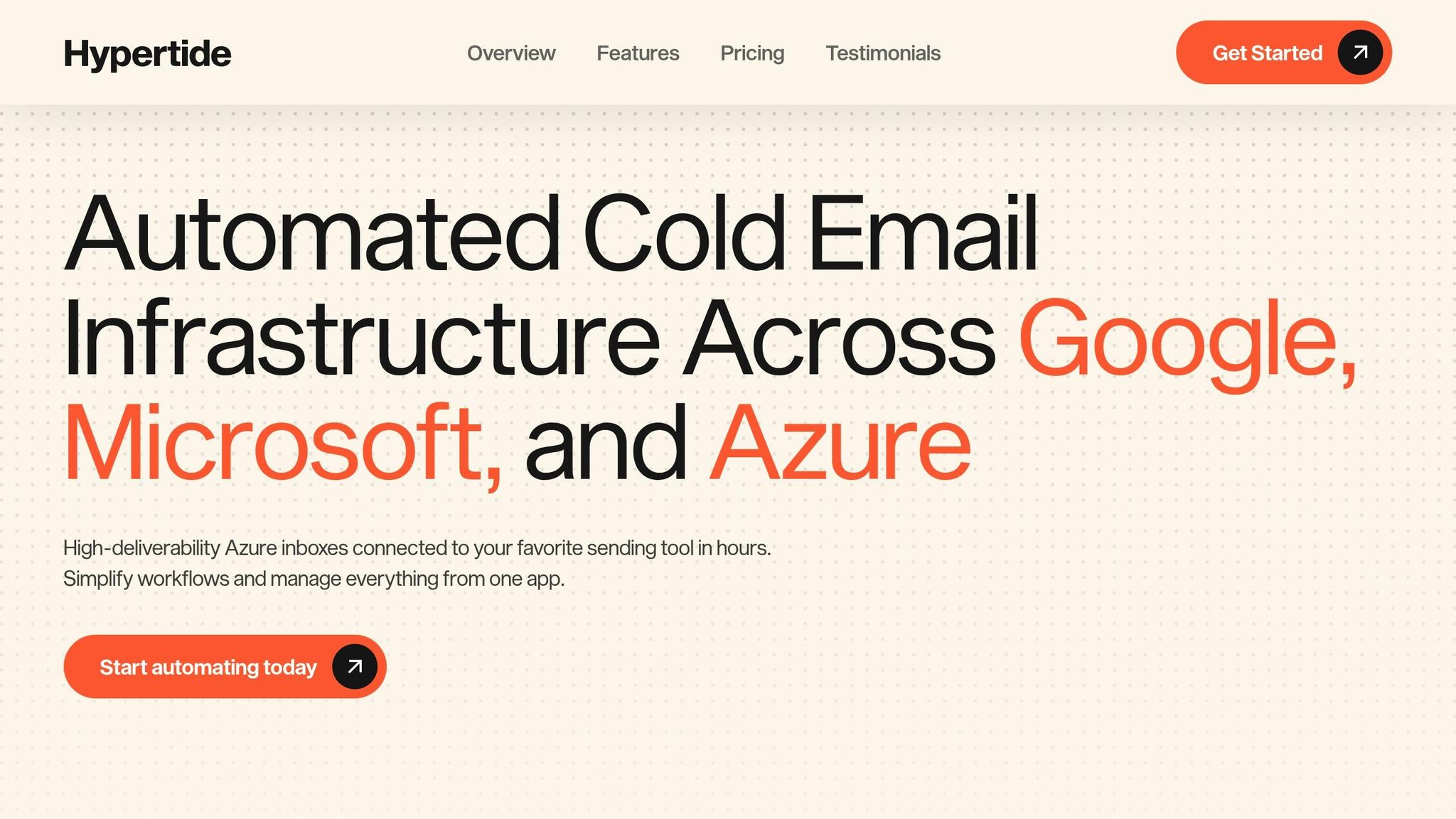
Information about Hypertide's API-driven email infrastructure is scarce, with no public details available regarding its compliance or automation features. This lack of transparency sets it apart from platforms that openly share such specifics.
While Hypertide remains somewhat of a mystery, the next section on Mailgun will shed light on alternative approaches to API-driven email infrastructure, offering a clearer perspective on this landscape.
5. Mailgun
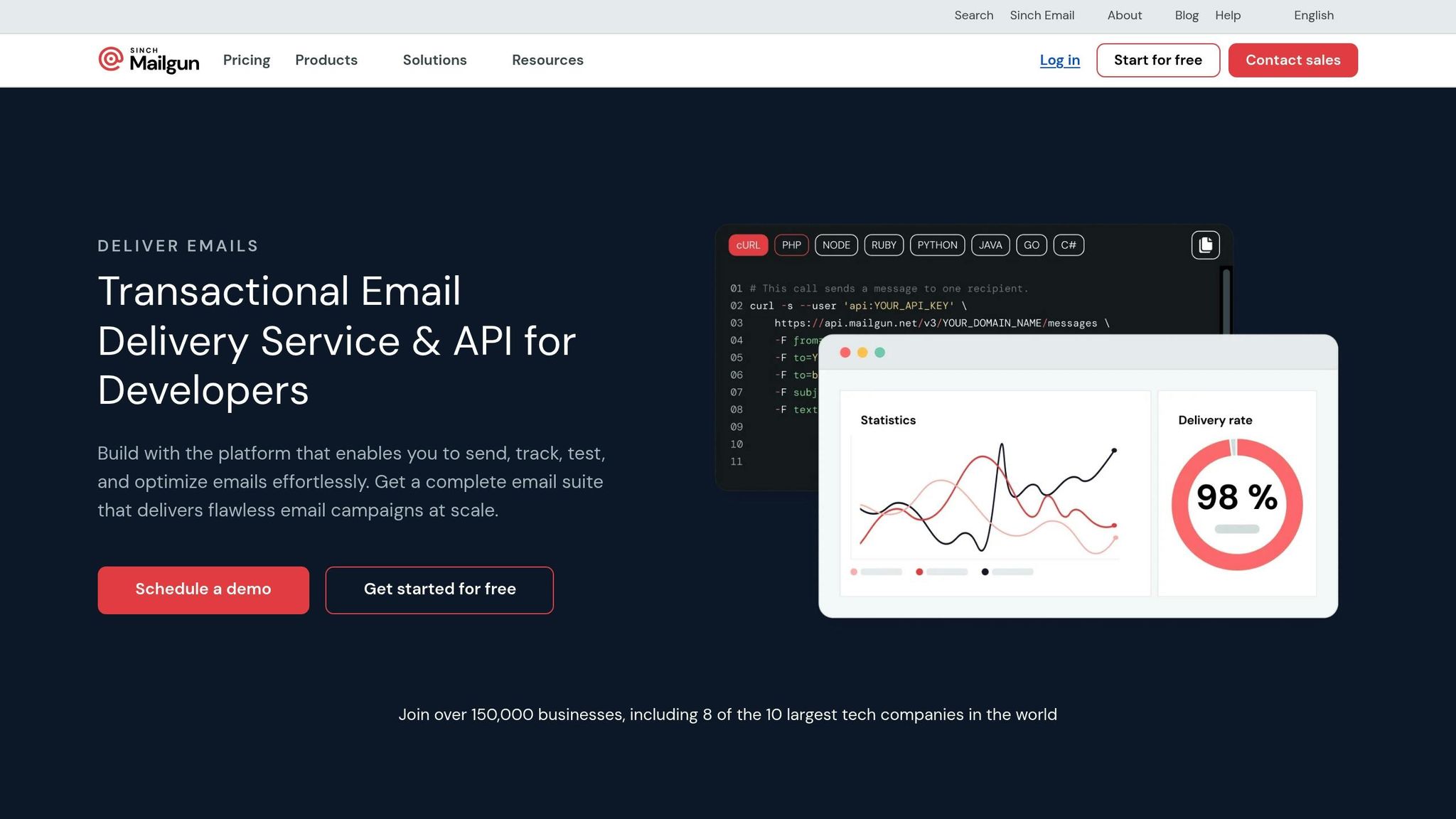
Mailgun takes a developer-centered approach, setting itself apart from platforms like Primeforge, which are tailored for cold email campaigns. Its primary strength lies in handling routine transactional emails rather than cold outreach.
The platform's RESTful API allows users to send, track, and manage emails with support for multiple programming languages. Features like scheduled sending and batch processing make managing email workflows more efficient. Additionally, Mailgun supports domain configuration and verification, enabling users to handle multiple sending domains while maintaining proper email authentication and reputation. However, its API is specifically designed for transactional emails, making it less suitable for cold email campaigns.
On the compliance side, Mailgun offers tools like suppression list management and automatic bounce handling to safeguard sender reputation and adhere to industry standards. Integration with various CRM systems via webhooks provides real-time updates on email activity. That said, Mailgun’s acceptable use policies restrict unsolicited bulk email, which limits its ability to support traditional cold email campaigns - an area where platforms like Primeforge excel.
Mailgun operates on a pay-as-you-go pricing model, offering scalability for growing needs. However, its focus on transactional email means it lacks features specific to cold outreach, such as built-in prospect management tools and email warming capabilities, which are essential for dedicated cold email platforms.
Platform Comparison: Advantages and Disadvantages
Choosing the right cold email infrastructure requires careful consideration of factors like API integration, DNS automation, compliance, performance tracking, and cost management.
API Capabilities and Technical Integration
Primeforge stands out with its robust API support, tailored specifically for cold email workflows. It integrates effortlessly with popular outreach tools and automates mailbox provisioning for both Google Workspace and Microsoft 365, making setup a breeze for marketing teams.
Infraforge, on the other hand, caters to enterprises that need private email infrastructure. It offers advanced API customization and multi-IP provisioning, giving users more control - though it does require a higher level of technical expertise to manage these features effectively.
Mailreef is a more straightforward option, with a simplified API designed for smaller campaigns. Hypertide provides moderate functionality, striking a balance between simplicity and capability.
Meanwhile, Mailgun is primarily geared toward transactional emails. Its RESTful API supports multiple programming languages, but its strict policies on unsolicited bulk emails make it less suitable for traditional cold outreach campaigns.
API capabilities are just one part of the equation - let's dive into how infrastructure and geographic positioning play a role.
Infrastructure and Geographic Positioning
For cold outreach, dedicated US-based infrastructure can significantly improve deliverability. Primeforge excels here, offering dedicated US-based IP addresses across all its plans. This setup enhances inbox placement and reduces the risk of emails being flagged as spam.
In contrast, traditional platforms like Gmail, Outlook, and SendGrid often lack dedicated IPs and full DNS control, making them less effective for cold email campaigns.
DNS Automation and Technical Setup
Managing DNS settings can be daunting, especially for agencies handling multiple clients. Primeforge simplifies this process with automated setups and bulk DNS updates, saving time and effort. Similarly, Infraforge supports DNS automation through custom domain configurations, providing flexibility for advanced users.
Compliance and Sender Reputation Management
Compliance strategies vary widely across platforms. Mailgun, for instance, includes compliance features tailored to transactional emails but imposes restrictions on unsolicited bulk emails, limiting its use for cold outreach. Dedicated cold email platforms, however, prioritize sender reputation with specialized monitoring and management tools to protect deliverability.
Performance Metrics and Monitoring
Real-time monitoring is essential for identifying and resolving issues like IP blacklisting or reputation problems. Dedicated tools available on platforms like Primeforge and Infraforge provide early alerts to help maintain campaign performance. Traditional email service providers often lack these specialized features, which can lead to delays in addressing problems and hurt overall campaign success.
Cost Structure and Scalability
Pricing models differ based on platform features and user needs. Primeforge offers predictable pricing, with per-mailbox rates ranging from $3.50 to $4.50 per month. This transparency makes budgeting easier.
Mailgun, with its pay-as-you-go model, works well for low-volume transactional emails but can become costly for high-volume campaigns. The choice between shared and private infrastructure also impacts costs. Shared options like Mailreef come with lower upfront expenses but offer less control over sending reputation. In contrast, private infrastructure via Infraforge requires a higher investment but provides greater operational control and reliability for large-scale outreach efforts.
Each platform has its strengths, but the right choice ultimately depends on your specific campaign needs and technical requirements.
Conclusion
When it comes to API integration, the best platform for your business hinges on your specific goals and technical requirements. The right choice will depend on what aligns most closely with your operational needs.
For small to medium-sized businesses, Primeforge is a standout option. With features like US-based IP addresses, automated DNS setup, and competitive pricing, it strikes a balance between functionality and simplicity. Plus, it supports both Google Workspace and Microsoft 365 mailboxes, making it a solid pick for teams seeking reliable deliverability without diving into complex technical setups.
On the other hand, large enterprises handling high email volumes might find Infraforge better suited to their needs. While it demands more technical know-how, it offers private infrastructure, multi-IP provisioning, and robust API capabilities. These features provide the scalability and customization essential for big operations.
Each platform brings something unique to the table, catering to businesses of different sizes and email strategies. For example, while Mailgun excels at transactional emails, it may not be the best fit for cold outreach campaigns.
FAQs
What makes Primeforge’s email infrastructure ideal for improving cold email deliverability?
Primeforge improves cold email deliverability by utilizing US-based IP addresses, offering dedicated mailboxes through Google Workspace and Microsoft 365, and providing an automated DNS setup to ensure emails are properly authenticated. These features work together to boost inbox placement and minimize the chances of emails being flagged as spam.
On top of that, Primeforge’s infrastructure includes features like bulk DNS updates, support for multiple workspaces, and the ability to customize mailbox profile pictures. These tools give users more control over their email campaigns, making Primeforge a more effective choice for cold outreach compared to standard email platforms.
What are the benefits of using dedicated IP addresses for email campaigns, and how do they improve deliverability?
Using dedicated IP addresses for email campaigns comes with some clear benefits, especially when it comes to cold outreach. With a dedicated IP, you’re in full control of your sender reputation, meaning your email deliverability won’t be impacted by the behavior of other senders sharing the same IP. This minimizes the risk of your emails being marked as spam or ending up on blacklists.
A dedicated IP also lets you closely monitor and manage your reputation, which can lead to better inbox placement rates and more consistent results. This becomes crucial for high-volume campaigns, where maintaining a strong reputation is key to reliably reaching your audience. By steering clear of the challenges tied to shared IPs, dedicated IPs give your emails a better shot at landing where they should - right in your recipients’ inboxes.
What should businesses consider when deciding between shared and private email infrastructure for cold email campaigns?
When deciding between shared and private email infrastructure for cold email campaigns, businesses need to weigh factors like deliverability, cost, and control over IP reputation. Private infrastructure offers dedicated IP addresses, which can greatly enhance inbox placement and minimize the chances of blacklisting - making it a solid choice for high-volume campaigns. That said, it often comes with higher expenses and a more complex setup.
On the other hand, shared infrastructure is a more budget-friendly option and easier to get started with. However, it may lead to lower deliverability rates because other users sharing the same IP can negatively impact performance. For companies focused on maintaining strong inbox placement and managing their reputation, platforms like Primeforge provide private email infrastructure designed for high deliverability. Features such as automated DNS setup and US-based IPs make it a reliable and efficient solution.